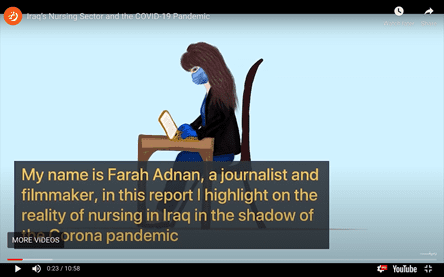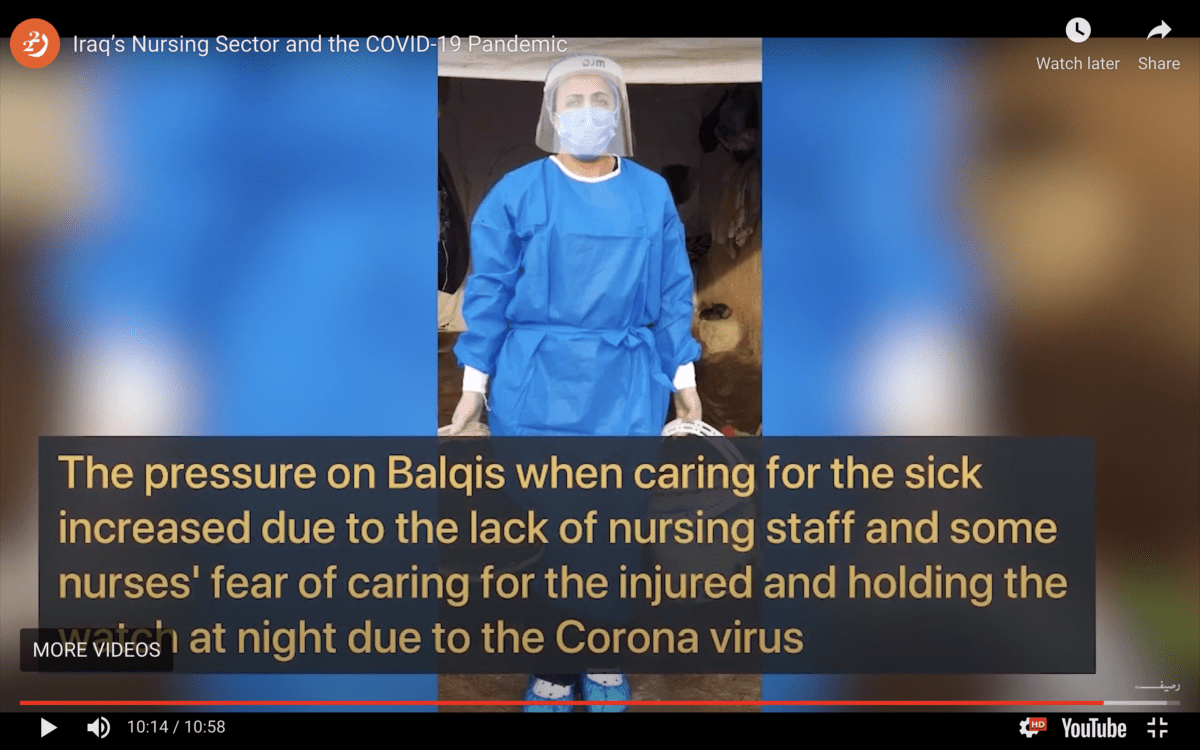By Kathryn Cleary
In the midst of the COVID-19 pandemic in Iraq, freelance journalist Farah Adnan took immediate notice of the dire shortage of nursing staff in Iraq’s public and private sector hospitals. Following the release of the World Health Organization’s (WHO) State of the World’s Nursing Report in April of last year, Adnan set out to further investigate the situation in her home country.

“Since the World Health Organization said that the world suffers from a shortage of male and female nurses, I began to search and investigate for the shortage between them in Iraq and Kurdistan. I relied on the language of numbers and data with the testimonies of nurses, comparing their numbers with doctors, and touching on some of their suffering and [the] difficulties [they faced] to obtain medical equipment.” I wanted to make clear that overall, Iraq’s healthcare system was suffering from a shortage of everything, she says.
As a very ambitious, freelance journalist, financial support for Adnan was hard to come by, but with the help of the Internews Information Saves Lives Rapid Response Fund, Adnan was able to publish a short documentary film report, in both Arabic and English, highlighting her findings. “When I read about the rapid response fund launched by Internews, I did not hesitate to apply.”
The rapid response fund from Internews helped me a lot to complete this project, says Adnan. “I wanted it to be a different report and to rely on numbers and creative graphics.” In order to complete the documentary, Adnan needed additional funding to be able to collaborate with a local Iraqi artist who could provide the illustrations used in the film. The final editing of the documentary was completed entirely on mobile phone by Adnan.

The documentary is about the reality of nursing in Iraq in the shadow of the COVID-19 pandemic, she says. “The nursing staff was the first to be affected,” she adds. “I brought numbers in the report, including information not published elsewhere, including some nurses’ fear of taking the COVID-19 vaccine as well.”
“Many people here want to talk about the circumstances [surrounding nursing], about their circumstances and their challenges, so I met male and female nurses from Baghdad and from the Kurdistan region. They talked about the lack of nursing staff in the workplace and how it [has] placed great pressure on them to take care of COVID-19 patients.”

Adnan’s report was published on the 26th of April, just before International Nurses Day on the 12th of May. “After publishing my report I hope that the [Iraqi] government notices, and that the reality of nursing in Iraq is changed for the better,” she says.
The Health Journalism Network is happy to report that responses to Adnan’s documentary have been very positive. Adnan says that while she was promoting the film on social media a journalist from Sudan reached out to her and shared that her report had inspired him to pursue a similar investigation in Sudan.
Another colleague from Lebanon also praised Adnan’s mobile editing and production skills of the film. “The method of editing and producing the video caught his attention and frankly I was happy with this call,” she says.